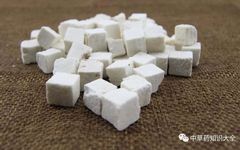Poria (Fu Ling) is a well-known traditional Chinese medicine and is commonly used as an herbal material. It offers numerous benefits to the human body, including the ability to relieve cough and eliminate dampness, strengthen the spleen and stomach, and exert antibacterial and anti-inflammatory effects during instances of internal inflammation. It can also alleviate symptoms of edema and promote metabolic functions, aiding those suffering from insomnia to fall asleep. Let us learn more about it!
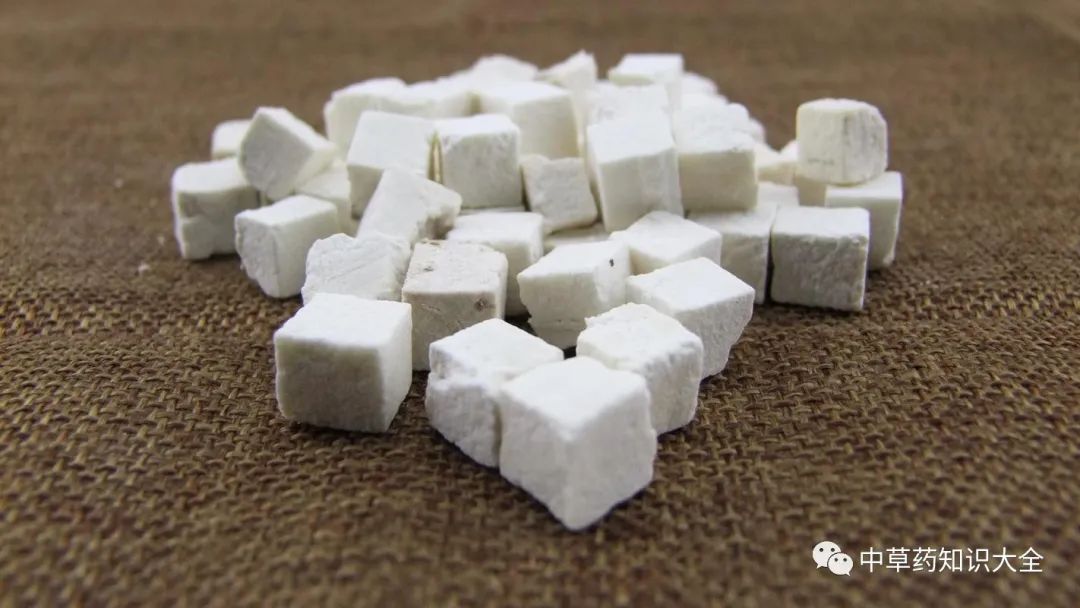 Poria is also known by various names: Fu Tu (《本经》), Fu Ling (《史记》), Fu Ren (《广雅》), Fu Ling, Fu Tu (《唐本草》), Song Yu (《记事珠》), Jiang Chen Fu Tai (《酉阳杂俎》), Yun Ling (《滇海虞衡志》), Fu Tu (《纲目》), Song Shu, Song Mu Shu, Song Ling (《广西中药志》).
Poria is also known by various names: Fu Tu (《本经》), Fu Ling (《史记》), Fu Ren (《广雅》), Fu Ling, Fu Tu (《唐本草》), Song Yu (《记事珠》), Jiang Chen Fu Tai (《酉阳杂俎》), Yun Ling (《滇海虞衡志》), Fu Tu (《纲目》), Song Shu, Song Mu Shu, Song Ling (《广西中药志》).
Original Form: The sclerotium is spherical, oval, elliptical, or irregular in shape, measuring 10-30 cm or longer, with varying weights, generally ranging from 500-5000 g. The outer shell is thick and wrinkled, dark brown, soft when fresh, and hardens upon drying; the interior is white or light pink and granular. The fruiting body grows on the surface of the sclerotium, is flat and thick (3-8 cm), white, fleshy, and turns light brown when old or dried. The tubes are densely packed, measuring 2-3 mm in length, with thin walls, and the openings are round, polygonal, or irregular, with a diameter of 0.5-1.5 cm, and the edges are serrated. Spores are rectangular to nearly cylindrical, smooth, with a slanted tip, measuring (7.5-9)μm×(3-3.5)μm.
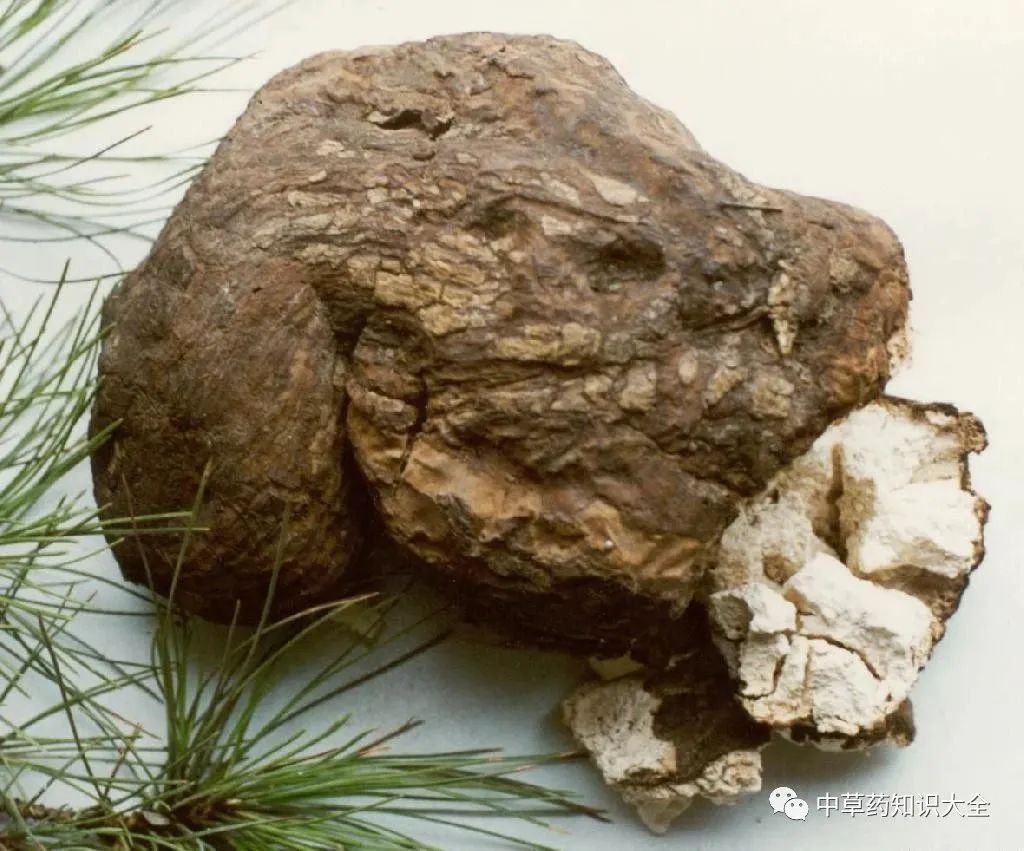
Preparation: For Poria, soak in water, wash, remove, steam thoroughly, slice, and dry. For Zhu Poria, spray clean water on the Poria blocks, slightly moisten, sprinkle evenly with fine Zhu Sha (cinnabar) powder, and mix repeatedly until the surface is coated with Zhu Sha powder, then dry (30 taels of Zhu Sha powder for every 100 jin of Poria).
Meridians: Heart; Spleen; Lung; Kidney
Properties: Sweet; Bland; Neutral
Precautions: Use with caution in cases of Yin deficiency without damp-heat, deficiency cold with spermatorrhea, or Qi deficiency with prolapse.
Functions and Indications: Promotes diuresis and drains dampness; strengthens the spleen and stomach; calms the mind and settles the spirit. Indicated for difficulty urinating; edema and fullness; phlegm and cough; vomiting; spleen deficiency with poor appetite; diarrhea; palpitations and anxiety; insomnia and forgetfulness; spermatorrhea with turbid discharge.
Dosage: For internal use: decoction, 10-15 g; or in pills or powders. For calming the mind, mix with Zhu Sha.
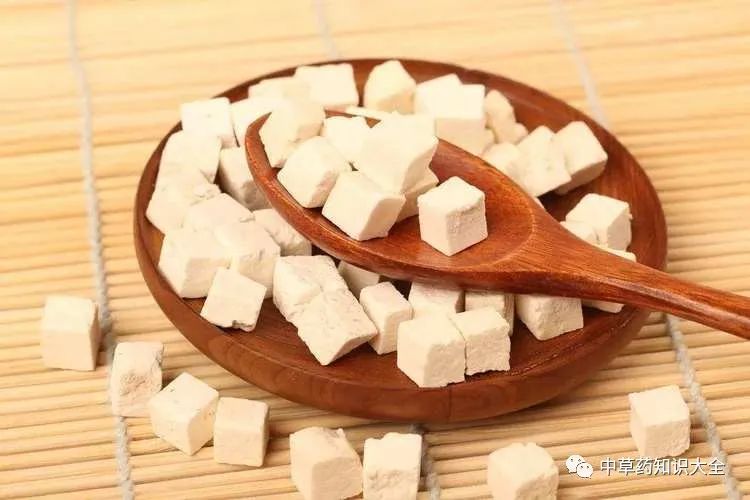 Effects and Functions of Poria –
Effects and Functions of Poria –
1. Relieves Cough and Eliminates Dampness
Many individuals suffering from chronic cough have significant dampness in their bodies. If the cough persists, Poria can be effective. Combining it with Ban Xia (Pinellia) and Chen Pi (dried tangerine peel) or with Gui Zhi (cinnamon twig) and Bai Zhu (White Atractylodes) for decoction can yield significant results.
2. Strengthens the Spleen and Stomach
Poria is an excellent health tonic, particularly for those with spleen and stomach deficiency, often leading to indigestion and frequent diarrhea. It can be used with Bai Zhu and Shan Yao (Chinese yam) to strengthen the spleen and stomach.
3. Antibacterial and Anti-inflammatory
Scientific studies have shown that the decoction of Poria has a significant inhibitory effect on Staphylococcus aureus and Escherichia coli, making it useful for alleviating infections and inflammation.
4. Alleviates Edema
For those experiencing difficulty urinating and body swelling, Poria can help alleviate these symptoms, especially when combined with Zhu Ling (Polyporus) and Ze Xie (Alisma) in decoction.
5. Promotes Metabolism
Poria contains polysaccharides, choline, triterpenoids, lecithin, and potassium and magnesium, which are beneficial for strengthening the spleen and calming the mind, effectively promoting metabolic circulation and enhancing the body’s immune capacity.
6. Treats Insomnia
Many people experience insomnia due to anxiety and restlessness. Poria can help calm the mind and body, and appropriate consumption can aid in treating insomnia.
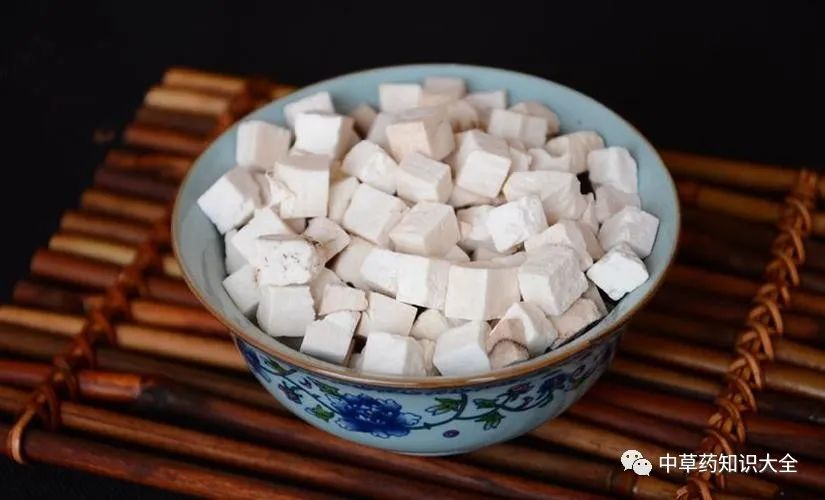 Precautions for Consuming Poria
Precautions for Consuming Poria
1. Avoid Excessive Consumption
Due to Poria’s diuretic and edema-relieving properties, it is important to avoid excessive consumption to prevent increased urination, which can deplete energy.
2. Contraindicated for Kidney Deficiency
For patients with kidney deficiency, consuming Poria is not advisable, as it may not provide benefits and could worsen the condition.

Note:This account aims to promote traditional Chinese medicine culture. The TCM knowledge mentioned in this article is for learning and exchange purposes only.
WeChat has been updated! If youneither star me nor like or “view” my articles, the system will assume you do not wish to receive information about herbal medicine, and ultimatelyyou will not receive our article updates
End of Article. Thank you for your patience in reading. If you find it helpful, please click “ Like” and “
Like” and “ View” at the bottom~
View” at the bottom~

